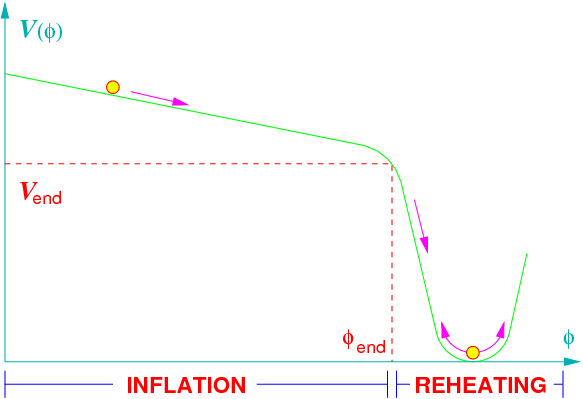It's generally considered that QM is the more fundamental theory, and GR is emergent from it.No, the GR theory isn't sufficient to explain quantum mechanics.
That's incoherent - a singularity is a mathematical artefact indicating the limits of a theory's applicability, it has nothing particular to do with light; the electromagnetic force emerged during the BB via symmetry breaking.Singularity isn't light, so quantum mechanics does not come into the big bang either.
That too is incoherent - particle-wave duality is a feature of 'everyday' QM and is demonstrated regularly in school labs, e.g. the double-slit experiment. If you're talking about 'virtual' particles, they're just a way of visualising some gnarly quantum interactions. It's not particularly relevant to the cause of the BB.I've heard the particle-wave of light were coming into and going out of existence, but that isn't something that can be shown nor observed happening. It's just a presupposition or assumption to cause the big bang.
Citation? I don't think that's right - recent ideas suggest that spacetime is emergent from quantum fields; Hawking was aware of that. One of his ideas was that there was no 'before' the BB, that time changed it's nature back towards the BB so that it simply closed off (by analogy with there being no 'north' of the north pole), so the universe was self-contained and just existed atemporally, but I don't think his version was successful...Besides, Stephen Hawking admitted one needs spacetime for quantum mechanics and before the big bang there was neither.
QM is non-intuitive, but then so is GR; it's really just a matter of scale - we evolved at a scale where the world relevant to us approximates classical Newtonian mechanics, so that's what's intuitive to us.To me the problem is there hasn't been an explanation to Neil Bohr's non-intuitive interpretation of the particle-wave experiments with light particles. He knew about the results and could only offer the Copenhagen theory, but it's the best we got so far from almost a century of work. This makes the quantum world weird.
There are plenty of formulations/interpretations of QM that are compatible with the mathematical formalism - Copenhagen is probably least popular among those that are interested in QM fundamentals. Everettian 'Many Worlds' is the simplest and increasingly popular, Bohmian Mechanics ('Pilot Wave' theory) has some unresolved problems, and there's a raft of objective collapse and transactional formulations... But they all purport to describe the same formalism.
They show QM to be right - it was developed by quite a number of physicists (including Einstein); Bohr proposed the Copenhagen interpretation, which is falling out of favour for having an unexplained instantaneous wavefunction collapse that is not part of the QM formalism.The complex experiments have shown Bohr's weird theory to be right.
Not necessarily - what happens at quantum scales results in semi-classical behaviour at macro scales; i.e. the everyday world we see is the aggregate effect of quantum behaviour at small scales, it is emergent from QM.I mean while what happens in our macro world is explained by Newton's force theory, GR and SR, it doesn't hold in the quantum world. Yet, the quantum world makes up the macro world, so shouldn't they jibe?
In the same way, our experience of air temperature and pressure, described by the gas laws, and the wetness, and flow characteristics of water, described by the laws of fluid mechanics, are emergent from the activities of billions of gas and water molecules, respectively. The individual molecules themselves don't have temperature, pressure, wetness, or flow characteristics, and are not described by gas laws or fluid mechanics - those are emergent properties of the bulk.
The consensus is that when we have a theory of quantum gravity that works in such extreme regimes, we'll have a mathematical description of what happened and a way to eliminate spurious explanations for how it may have come about, so we can narrow the options and maybe discover whether it could have been a bounce, a collision of branes, an energetic phase change, or whatever.Is there anything to state for quantum gravity to get it into existence before the big bang? We don't have a good explanation for Bohr's theory so it's left open as the Copenhagen interpretation. The scientists think we just don't know what the others are, i.e. not enough data.
Upvote
0



